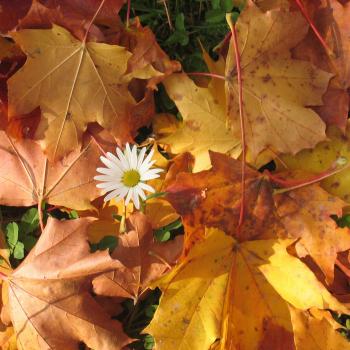Despite recent snow and ice events in my part of the world, I am beginning to see early signs of the rebirth of spring all around. The daffodils I inherited from my grandmother have sent green shoots through the melting snow. Bird songs greeted me this morning when I left the house. I am enjoying the sun’s increasing presence, and there’s an earthy smell of growth in the cool, wet air. I’m also participating in my own rebirth, as part of my daily practice for this season (see A Daily Pagan Practice for the Year).
 Throughout my adult life, I have constantly been reborn. Some people thrive in consistent and routine existences. I have a need for a stable foundation myself, in the forms of a daily meditation practice, a healthy marriage and family, connection with my fellowship and community, and steady employment in an established company. But in most other areas of my life I crave perpetual development and new beginnings. If I stay in the same place too long I begin to feel depressed and start to question the purpose of my time on earth. I’m constantly learning to play new instruments, reading books and watching documentaries on topics I’ve recently become obsessed with, creating art using a variety of materials, taking up unusual hobbies, and delving into new or expanded spiritual concepts and practices.
Throughout my adult life, I have constantly been reborn. Some people thrive in consistent and routine existences. I have a need for a stable foundation myself, in the forms of a daily meditation practice, a healthy marriage and family, connection with my fellowship and community, and steady employment in an established company. But in most other areas of my life I crave perpetual development and new beginnings. If I stay in the same place too long I begin to feel depressed and start to question the purpose of my time on earth. I’m constantly learning to play new instruments, reading books and watching documentaries on topics I’ve recently become obsessed with, creating art using a variety of materials, taking up unusual hobbies, and delving into new or expanded spiritual concepts and practices.
I don’t think these rebirths really change me; instead they make me more of who I already am as I incorporate all that I’ve learned and become into the underlying core of my self and of my daily life.
At this time, I’m being reborn into new (to me) leadership roles at my congregation, Unitarian Universalist Fellowship of Harford County. In April I will be take on the leadership of our Women’s Ritual Circle. I will begin by coordinating a Sunday worship service near the end of March for Ostara, and after that I will organize our sabbath rituals with the assistance of our members, many of whom have been turning the wheel of the year within this Circle for 10-20 years. I am excited and proud to help continue this legacy. I have also accepted a seat on the Executive Board at the fellowship, where I am learning the intricacies of what it takes to run a thriving church from a dedicated and caring group of people who represent a diverse set of beliefs and backgrounds. As far as I know, I’m the only pagan currently on the board, and I see that as a wonderful opportunity, in many ways.
It is important to ask, “What do we, as UU pagans, bring to the table when we serve in leadership roles?” The simplest answer, perhaps, is an increased emphasis on the state of the environment and our natural surroundings. But UU pagans have so much more to offer when we manage projects and activities.
To begin with, we bring a sense of flexibility and creativity to the work at hand. We are used to thinking outside of the box because that’s the niche we permanently inhabit, and this skill translates into a big advantage when we’re faced with limited budgets and volunteers, time constraints, and inevitable last minute challenges. Anyone who has ever made an impromptu alter or created a chant on the spot can turn what others may view as a dead end into an exciting portal to new experiences.
UU pagans also tend to have a well-developed talent for cooperation. The community of pagans, Wiccans, Druids, earth-centered folks, and all the other names we have for ourselves is as diverse as it is widespread. And our UU association and congregations envelope us in an even more diverse web of beliefs and opinions. We are used to working and playing with people we don’t see eye to eye with, and as a result we have the patience and wisdom to understand that all voices have the potential to provide valuable insight and novel ways of looking at and addressing opportunities and problems.
As leaders in non-pagan and non-UU settings, we also provide a chance for others to learn what paganism and Unitarian Universalism is, as well as what it is not. A couple of years ago I was co-leading an adult religious education class designed to help UU’s better define their own beliefs and personal creeds, and I mentioned that I was involved in our fellowship’s pagan group. A fellow member who is highly active in the Christian group nearly fell out of his chair because he didn’t realize that we existed, and he seemed pretty upset at the prospect. This gave me the opportunity to discuss what it is that I believe, and what it is that our Circle does. I was able to dispel some of his misunderstandings and we remain friends and have had several pleasant and informative conversations at social events since then. Unfortunately, there are many people who associate paganism and Wiccanism with Satanism and/or evil. When we assume positions of leadership outside of our pagan groups, we have the opportunity to dispel those myths with our words and demonstrate who we really are and what we stand for with our actions. In my leadership roles away from the fellowship, I talk a lot about my work in the congregation and take the opportunity to explain to others what UUs believe whenever I’m asked.
Finally, as leaders we bring a spirit of playfulness to our projects. I manage large proposals for a living, and I’ve learned that nothing rejuvenates a tired or frustrated team of people like a leader with a sense of humor. UU pagans are masters of play. We thrive by finding ways to interpret and interact with our surroundings through the use of mythology, analogy, and magic. And unless we take ourselves too seriously, this will spill over into our leadership styles, making us more light-hearted and desirous of promoting others’ sense of well-being and happiness.
Another question worth asking, then, is “What do UU pagans stand to receive from being in leadership roles?” Obviously we get what everyone else gets out of managing a project or team: a sense of satisfaction, experience that assists us in other areas of our lives, increased patience, improved connectivity, and more highly developed problem solving skills. According to happiness psychology research, doing volunteer work also improves our mental and physical health.
But aside from these invaluable benefits, becoming a leader in a pagan or wider UU group enables us to make more connections with the larger fellowship. This helps us to develop a better understanding of other’s backgrounds, viewpoints, and beliefs. And that, in turn, enables us to have a better understanding of our own viewpoints and beliefs. Leading helps us to become better pagans and better Unitarian Universalists.
I encourage all UU pagans to find a leadership position that suits their skills, whether for just a day or for a few years. We have so much to offer the earth and all of her people, and it’s a wonderful way to foster personal rebirth.

















